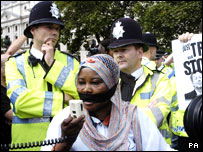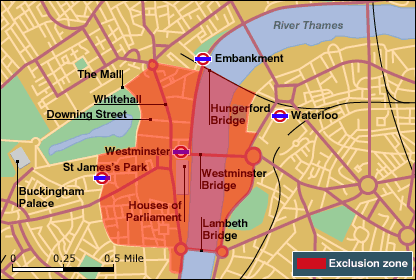Untitled Document
 |
Protesters wore gags over
their mouths to symbolise the ban |
Five anti-war activists demonstrating against a ban on unauthorised
protests near Parliament have been arrested.
A ban on protests within half-a-mile of Westminster which have not been cleared
by police came into force at midnight.
However, about 50 people wearing black gags to symbolise the "infringement"
of their right to protest have gathered in Parliament Square in defiance.
Ministers say planned protests can be held but the rights of protesters and
workers in the area must be balanced.
But campaigners say the move restricts an established right to protest.
More than a dozen police officers were at the scene, and arrests were made
around an hour after the protest begun.

Takes effect from 1 August 2005
Anyone organising or taking part in a demonstration
within the zone must apply in writing and have police authorisation
Approval may be subject to conditions
Use of loudspeakers and megaphones may be restricted,
and are banned in and around Parliament Square, subject to exemptions
Time limits may be placed on approved demonstrations
'Draconian law'
Lindsey German, convener of the Stop the War Coalition, said the ruling meant
police could now decide who was allowed to demonstrate, which was "totally
unacceptable".
"Anyone speaking through a megaphone will be arrested under this draconian
new law. Parliament should be doing more important things than stopping people
staging legitimate protests," she said.
Lauren Booth, sister of Tony Blair's wife Cherie, joined the protest and said
the law should be "overturned".
"This is all about silencing critics of the war in Iraq and ID cards and
denying people the right to free speech," she said.
"If you heard on television that someone in another country were banned
from gathering near a government building to stage a legitimate protest you
would probably think thank goodness that kind of thing doesn't happen in this
country."
The Serious and Organised Crime and Police Act, parts of which came into force
last month, grants the home secretary the power to ban unauthorised protests
within a half-mile radius of Parliament.
The Home Office says it puts protests on the same footing as processions, for
which police also need to be notified.
Within the zone, police have powers to set time limits on protests and ban
loudspeakers and placards.
Critics of the exclusion zone also said there was no need to extend the ban
over such a wide area - it will cover St James's Park, much of the South Bank
and Charing Cross to Lambeth Bridge.
London Eye
The London Eye, scene of an 18-hour Fathers 4 Justice protest last September,
is also included in the zone, although traditional protest venue Trafalgar Square
is not.
The demonstrators were joined by Brian Haw, who won a legal battle on Friday
to continue his anti-war vigil outside Parliament.
Mr Haw, from Worcestershire, has been in Parliament Square for four years,
despite attempts to evict him.
Some MPs said his numerous placards were an eyesore and his attacks on government
policy - often made through a loudspeaker - were distracting them from their
work.
Lawyers for Mr Haw said his demonstration had begun four years ago and therefore
he did not have to apply for authorisation.

